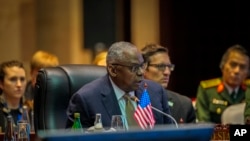ລັດຖະມົນຕີກະຊວງປ້ອງກັນປະເທດສະຫະລັດ ທ່ານ ລອຍດ໌ ອອສຕິນ ສະແດງຄວາມເສຍໃຈໃນວັນພຸດວານນີ້ ທີ່ຝ່າຍຈີນ ໄດ້ເລືອກບໍ່ ເຈລະຈາກັບທ່ານ ໃນລະຫວ່າງການປະຊຸມຂອງຫົວໜ້າປ້ອງກັນປະເທດໃນພາກພື້ນເອເຊຍຕາເວັນອອກສຽງໃຕ້ຢູ່ປະເທດລາວ ໂດຍເອີ້ນມັນວ່າ “ເປັນຄວາມລົ້ມແຫຼວຂອງພາກພື້ນທັງໝົດ.”
ສະມາຄົມປະຊາຊາດແຫ່ງເອເຊຍຕາເວັນອອກສຽງໃຕ້ ພວມຈັດການເຈລະຈາດ້ານຄວາມປອດໄພຢູ່ນະຄອນຫຼວງວຽງຈັນ ໃນເວລາທີ່ການຂັດແຍ້ງກັນທາງທະເລກັບຈີນເພີ້ມຂຶ້ນ ແລະ ໃນຂະນະທີ່ການຫັນປ່ຽນປະທານາທິບໍດີອາເມຣິກາຄົນໃໝ່ໃກ້ຈະມາເຖິງ.
ທ່ານ ອອສຕີນ ກ່າວຫຼັງການປະຊຸມໃນມື້ທຳອິດວ່າ ການຕັດສິນໃຈຂອງລັດຖະມົນຕີກະຊວງປ້ອງກັນປະເທດຈີນ ທ່ານ ດອງ ຈຸນ ແມ່ນຄວາມເສຍຫາຍສຳລັບທັງພາກພື້ນທັງໝົດ.
ທ່ານກ່າວວ່າ “ມັນບໍ່ເປັນຈັ່ງໂຊກ. ມັນໄດ້ສົ່ງຜົນກະທົບຕໍ່ພາກພື້ນເພາະວ່າ ພາກພື້ນຕ້ອງການຢາກເຫັນພວກເຮົາ, ສອງຜູ້ນຳທີ່ສໍາຄັນຢູ່ໃນພາກພື້ນ, ສອງອໍານາດທີ່ສໍາຄັນ ເຂົ້າມາສົນທະນາກັນ, ແລະນັ້ນ ຈະໃຫ້ການຄ້ຳປະກັນອີກຄັ້ນນຶ່ງຕໍ່ພາກພື້ນທັງຫມົດ.”
ຍັງບໍ່ມີຄວາມເຫັນໃດໆໃນທັນທີຈາກຈີນ ກ່ຽວກັບການຕັດສິນໃຈທີ່ຈະບໍ່ພົບປະກັບ ທ່ານ ອອສຕິນ.
ທ່ານ ອອສຕິນ ຫາກໍ່ສິ້ນສຸດການພົບປະໃນປະເທດ ອອສເຕຣເລຍ ກັບບັນດາເຈົ້າຫນ້າທີ່ຢູ່ທີ່ນັ້ນ ແລະກັບລັດຖະມົນຕີປ້ອງກັນປະເທດຍີ່ປຸ່ນ. ເຂົາເຈົ້າໃຫ້ຄຳໝັ້ນສັນຍາທີ່ຈະສະໜັບສະໜູນອາຊຽນ ແລະ ໄດ້ສະແດງ “ຄວາມເປັນຫ່ວງຢ່າງໜັກໜ່ວງກ່ຽວກັບການກະທຳທີ່ບໍ່ມີສະຖຽນລະພາບຢູ່ທະເລຕາເວັນອອກ ແລະ ໃຕ້, ລວມທັງການກະທຳທີ່ອັນຕະລາຍຂອງສາທາລະນະລັດປະຊາຊົນຈີນຕໍ່ ຟີລິບປິນ ແລະ ບັນດາກຳປັ່ນຂອງປະເທດແຄມທະເລອື່ນໆ.”
ນອກຈາກສະຫະລັດ ແລະ ຈີນແລ້ວ, ປະເທດອື່ນໆທີ່ເຂົ້າຮ່ວມກອງປະຊຸມອາຊຽນເປັນເວລາ 2 ມື້ ຈາກນອກເອເຊຍຕາເວັນອອກສຽງໃຕ້ຍັງລວມມີ ຍີ່ປຸ່ນ,ເກົາຫຼີໃຕ້, ອິນເດຍ ແລະ ອອສເຕຣເລຍ.
ຄຽງຄູ່ກັບ ຟີລິບປິນ, ສະມາຊິກອາຊຽນອື່ນໆໄດ້ແກ່, ຫວຽດນາມ, ມາເລເຊຍ ແລະ ບຣູໄນ ກໍມີຄວາມຂັດແຍ້ງກັບຈີນຢູ່ຂົງເຂດທະເລຈີນໃຕ້ເຊັ່ນກັນ, ເຊິ່ງປັກກິ່ງໄດ້ອ້າງເອົາຂົງເຂດເກືອບທັງໝົດ ເປັນດິນແດນຂອງຕົນ.
ອ່ານຂ່າວດ້ານລຸ່ມນີ້ເປັນພາສາອັງກິດ
VIENTIANE, Laos (AP) — U.S. Secretary of Defense Lloyd Austin expressed regret Wednesday that his Chinese counterpart chose not to hold talks with him during meetings of Southeast Asian defense chiefs in Laos, calling it a setback for the entire region.
The Association of Southeast Asian Nations is holding security talks in Vientiane at a time of increasing maritime disputes with China and as the transition to a new U.S. president approaches.
The decision by Chinese Defense Minister Dong Jun “is a setback for the whole region,” Austin said after the first day of meetings.
“It's unfortunate. It affects the region because the region really wants to see us, two significant players in the region, two significant powers, talk to each other, and that reassures the entire region,” he said.
There was no immediate comment from China on its decision not to meet with Austin.
Austin just wrapped up meetings in Australia with officials there and with Japan's defense minister. They pledged to support ASEAN and expressed their “serious concern about destabilizing actions in the East and South China Seas, including dangerous conduct by the People's Republic of China against Philippines and other coastal state vessels.”
In addition to the United States and China, other nations attending the two-day ASEAN meetings from outside Southeast Asia include Japan, South Korea, India and Australia.
Along with the Philippines, ASEAN members Vietnam, Malaysia and Brunei have competing claims with China in the South China Sea, which Beijing claims almost entirely as its own territory.





ຟໍຣັມສະແດງຄວາມຄິດເຫັນ